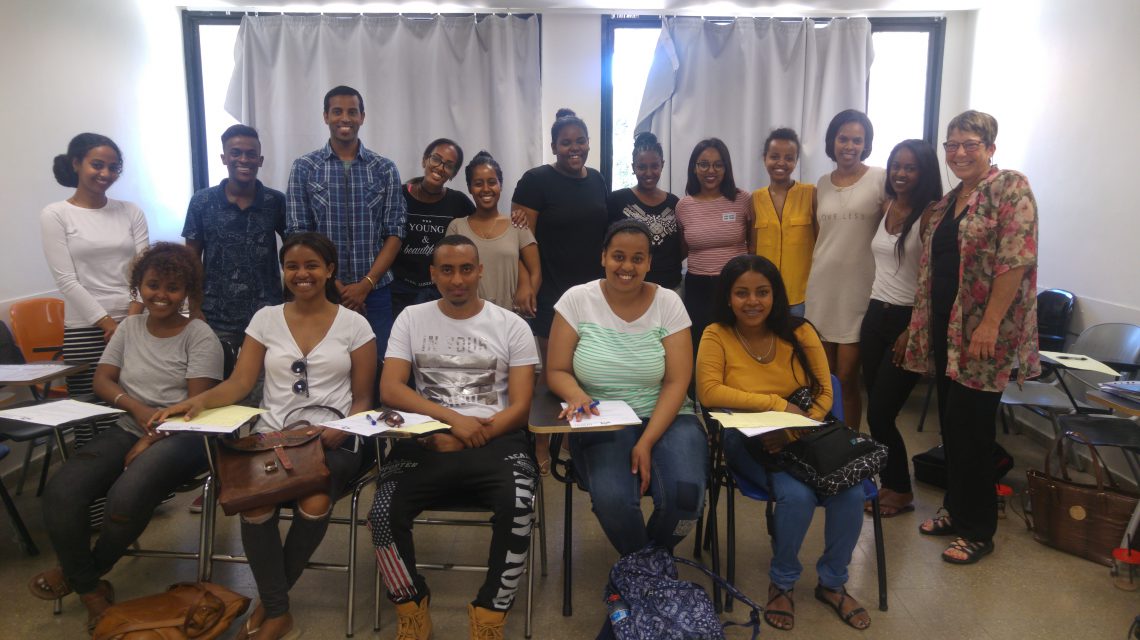
“I know that some people are fine with looking at a screen all day, but I know I need the human touch–to work with people. I want to be a nurse, ” relates Sarah Talala, one of the 18 students of Ethiopian background who were given the opportunity to take a course which enabled them to advance to pre-academic studies at the Hebrew University and then on to nursing school at the Hadassah-Hebrew University Henrietta Szold School of Nursing.
The Achoteynu (our sister/nurse) pilot program, funded by the Patricia Lapan Scholarship Fund, allows these students to bypass the psychometric exams, which have proven to be a barrier to them. Sarah had scored 29 points short of the minimum needed to be accepted for nursing.
“I wasn’t sure I wanted to try again,” she says. “It’s not only the time and huge effort to go over the material, but such an emotional strain when you don’t succeed.”
Sarah’s mother is in a WhatsApp group of Ethiopian relatives and someone mentioned the program to her. As Sarah recalls, “My mother knew it would be my dream come true.” When Sarah realized the deadline for applying had already passed, she called the coordinator. “I begged, telling her how much I wanted to be a nurse,” she remembers. “She liked my attitude and let me in.”
Another student, Malka Abera, explains: “It’s known that Ethiopian students score lower, but no one is sure why. The math is harder than in the SAT’s, but we all passed math in high school. Some speculate that you can predict the psychometric scores by factoring in how many years of education someone’s parents have had and if they lived in the center of the country or the periphery. Many of our parents didn’t go to school at all or for more than a few years.”
All l8 of the Lapan Scholars in the program passed this initial course; if they also pass the pre-academic courses at the Hebrew University, they will be automatically admitted to the Szold School of Nursing.
Inbal Hanania, age 24, had volunteered in hospitals with her fellow soldiers while she was in the army. She found out about the Achoteynu program on a Facebook page that provides support for Ethiopian Israelis and was sure she wanted to participate. Her sister had scored high enough to get into nursing school, but Inbal’s score fell a little short. “I wanted to follow in my sister’s footsteps, and was heartbroken when I failed to get in. Then suddenly, there was a chance for me.”
Tamar Anayo, age 24, did her National Service as a volunteer in the Gastro Institute at Hadassah Hospital Ein Kerem. “My dream was really to be a doctor,” she says.”I was inspired by my uncle who is an MRI technician and subtly influenced me to go into a field of medicine–even though I was afraid of hospitals! But now I am just the opposite–I know how to be part of a team, and how to carry through.”
The five-week course surpassed her expectations. “I was surprised at how much warmth and empathy we got from the professors,” she says.
Menalosh Kassea, age 21, came to Israel with her mother. Her father, a teacher, stayed behind. She brings out: “My mother, who only had three years of schooling, is proud that I’ll have the opportunity that she never had. I, too, dreamed of being a doctor, but when I saw the numerous requirements, I decided I would do as well in nursing. I heard about the program on a WhatsApp group I have with friends.”
Malka recalls how inspired she was the day she spent shadowing Trauma Nurse Julie Benevisti. “She’s not a nurse in one department,” she explains, “but follows her patients from the trauma center to whatever department they are moved to for their hospital stay.” I know it’s a long time until we get to this point,” she says, “but it was nice to see what a nurse can do at the end of her studies.”
One day, Malka was trying to get the attention of her teacher, but her desk was surrounded by other students. “I just stood there and thought I’d wait until last,” says Malka. The teacher, however, took her aside and said she needed a private lesson in “how to make a place for myself at the table.” Malka notes: “That’s the literal table and the figurative one. I can’t wait for anyone to do it for me. I have to step forward.”
